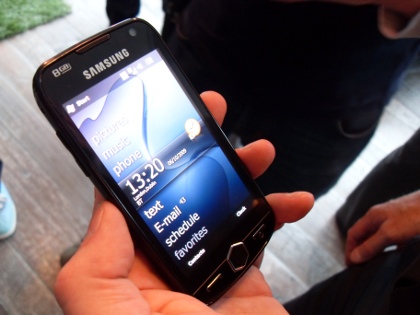Touch-centric Windows phones go on sale

Microsoft has launched Windows Mobile 6.5, and announced that Windows-branded handsets with the operating system will go on sale around the world on Tuesday.
The 'Window phones' branding marks a shift, as devices using the Windows Mobile operating system were previously marketed as 'Windows Mobile' phones.
The branding is part of a major drive by Microsoft to raise awareness of its smartphone operating system among consumers. "Less than 10 percent of users know Windows has a phone [version]," Windows Mobile marketing chief Kevin Keith said at a London launch event on Tuesday.
The software maker is increasing its marketing budget for Windows phones by around 40 percent, according to Keith. The campaign that begins on Tuesday will take in television advertising for the first time, he added. Microsoft is moving in the direction of being "a fun brand", said Alex Reeve, the head of Microsoft's UK Windows Mobile team.
The first Windows phones to go on sale come from manufacturers HTC, LG and Samsung. Sony Ericsson plans to introduce a Windows Mobile 6.5 handset — the X2 — on 30 October.
Windows Mobile 6.5 has full touchscreen capabilities — a change from its predecessors, which had a more limited touch interface. Nevertheless, at least one handset using the OS is launching without a touchscreen, according to Reeve.
Reeve said Microsoft wants to target those who need a mobile device that handles both business and consumer tasks. "We think we can do better than any of our competitors who either play in one space or the other," Reeve said at the launch. "We do both."
The user interface improvements in Windows Mobile 6.5 are somewhat "too little, too late", Gartner analyst Roberta Cozza told ZDNet UK. "Microsoft is trying to give the platform more of a consumer flavour — the user interface has always been a big limitation of Windows Mobile," Cozza said.
While the new user interface is more touch-centric, it still marks "a small improvement" compared with the touch interfaces available on other phones, she said.
Windows Mobile 6.5 uses a new version of the mobile Internet Explorer. The updated browser can now handle basic Flash content on websites, and makes it easier to pan and zoom than in previous versions. Reeve described the earlier iterations as being "where Microsoft hasn't kept up with the market as well as we should have done".
In addition, Windows phones will carry Microsoft's mobile app store, Marketplace for Mobile. The store launches on Tuesday in the UK with around 60 applications, and worldwide with around 250. Rival app stores for Google's Android and Apple's iPhone operating systems have thousands available.
Marketplace for Mobile is starting out with fewer applications than its rivals because "to some extent, developers want to see the thing", Reeve told ZDNet UK, promising that there will be a "massive increase" soon. He noted that a second version of the store will arrive in November, with increased DRM copy protection for applications.
On at least one Windows phone, Samsung's Omnia II, Marketplace for Mobile co-exists with Samsung's own app store. The two stores use separate billing systems.

Cozza said the introduction of Marketplace for Mobile is a good move for Microsoft, as "what makes or breaks a product more and more is the [developer] ecosystem around the device". She noted that the software maker has a good track record for keeping developers happy, but was sceptical it could transfer this success to the consumer application market.
The Gartner analyst also pointed out that consumers expect applications on new phones to perform to the standard they are used to, and that could be a problem for Windows Mobile. "If you think about what a developer can do on the iPhone — with gaming, for example — it's probably less sophisticated for Windows Mobile. The touch experience is still limited."
As Microsoft looks to the consumer market, Cozza said that in the enterprise market, the iPhone is catching up with Windows Mobile, and Android is lined up to do the same in the long term. "Apple introduced their security features because of demand from enterprise users," she said.
Cozza suggested that employees will want to have consumer features on the phones they use for business. "More consumer-oriented devices... will enter into the enterprise because users want them," she said. "This puts pressure on Microsoft and RIM."